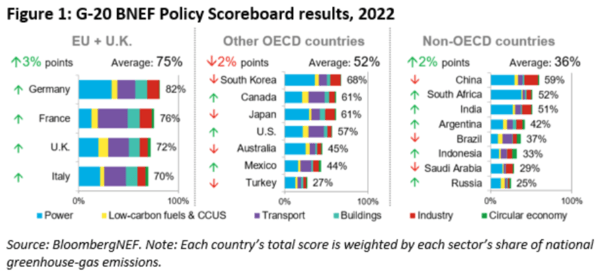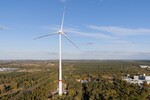News Release from windfair.net
Wind Industry Profile of
G20 fails on climate action
The 19 most important industrialized and emerging countries plus EU, these are the states that formally constitute the G20. At the same time, these states are the biggest climate sinners, responsible for almost 80% of global greenhouse gas emissions. It's becoming apparent again that their governments are following up with far too little action, despite big promises on climate protection. Yet time is increasingly pressing: as the latest interim report of the Intergovernmental Panel on Climate Change (IPCC) highlighted once again just a few weeks ago, man-made climate change is here to stay: The impacts are already "widespread," some are "irreversible," and 3.6 billion people live in places that are "highly vulnerable to climate change."
Another report by the BloombergNEF (BNEF) research group, "G-20 Zero-Carbon Policy Scoreboard", bitterly concludes that not a single G20 country has taken sufficient policy action to achieve deep decarbonization. The study focuses on the extent to which climate rhetoric on the international stage matches actual G20 action.
Six areas that policymakers could address to limit greenhouse gas emissions were analyzed in detail. Progress has been made by as many as 11 of the 19 countries (plus EU) in implementing programs to decarbonize the energy sector and, to some extent, transportation. But in the buildings and industrial sectors in particular, the measures taken to date are far from sufficient.
Michael R. Bloomberg, the UN Secretary-General's Special Envoy for Climate Action and Solutions, is therefore sharply critical of the attitude of those in charge: “Words only matter if they’re backed up with action – and the dangerous reality is, none of the G20 countries are delivering the emissions cuts they’ve promised fast enough."
“Government pledges often get the headlines and promises made around COP26 last year were impressive,” said BNEF head of policy Victoria Cuming. “But talk is cheap – none of the G-20 countries has implemented sufficient concrete incentives and regulations to achieve what’s been promised.”
The report sees the most improvement among EU member states Germany, France and Italy, as well as the United Kingdom. However, even the top performers could do more. At the bottom of the rankings are emerging economies such as South Africa and India, although the report explicitly praises the progress coming from there.

How did each of the G20 countries perform? (Image: BloombergNEF)
Moreover, in recent weeks, a whole new aspect has been added to the previous considerations around climate policy. Russia's invasion of Ukraine has brought energy security issues back to the forefront for many governments. Especially the independence from fossil raw materials from Russia can be reduced with a strong expansion of renewable energies. Thus German Finance Minister Christian Lindner (FDP) called renewables "freedom energies," and even in the U.S., where the major fiscal package involving billions of dollars in clean energy investments was roiled in partisan political battles, new funding for the renewables sector is again being actively considered.
The White House's new fiscal 2023 budget proposal e.g. includes increased funding for the Environmental Protection Agency (EPA), the Department of Energy and the Department of the Interior, as The Hill reports. $11 billion is earmarked for the EPA alone, an increase of about $1.5 billion over the $9.56 billion Congress appropriated last year.
The budget proposal also includes $3.3 billion for renewable energy, as gas prices have skyrocketed even further in light of the crisis in Ukraine. The crisis in Europe also highlights the need in the U.S. to fully transition away from fossil fuels.
"Russia’s actions in Ukraine have brought new urgency to the push for clean energy, and it has been encouraging to see countries recognize the need to speed up their plans, because we don’t have a moment to waste," Bloomberg makes clear.
An unexpected turn of events that may give hope for the next report.
- Author:
- Katrin Radtke
- Email:
- press@windfair.net
- Keywords:
- climate change, G20, IPCC, USA, Germany, Russia, Ukraine, war, fossil fuel, promise, action, climate action
























